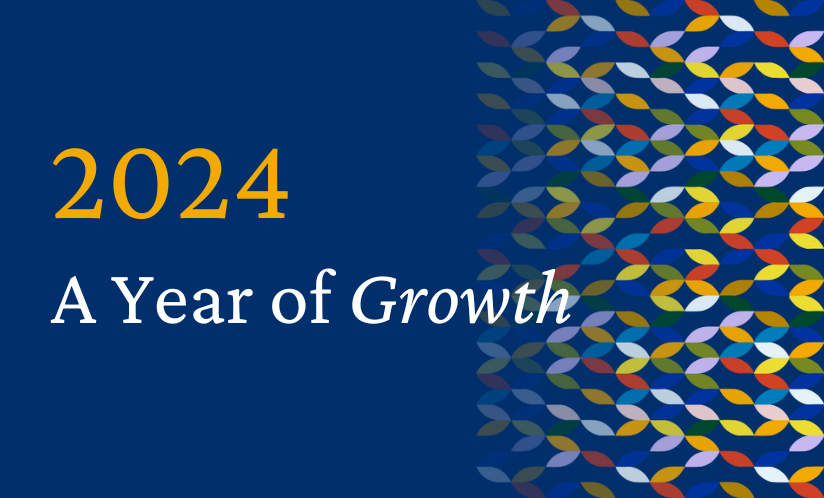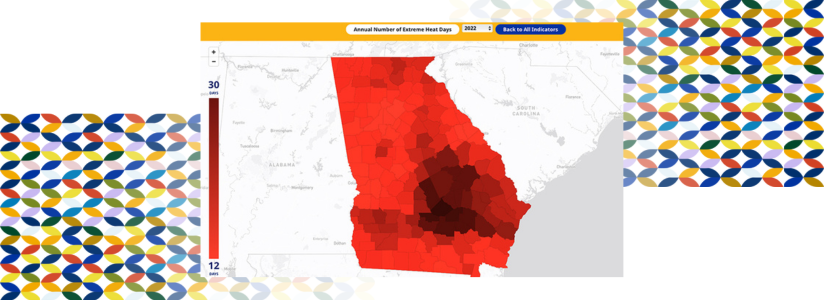2024: A Year of Growth

Throughout 2024, Emory’s Rollins School of Public Health expanded its academic offerings, advanced innovative public health research and practice, and grew its impact. Faculty, staff, and students helped move public health forward and create a healthier world for all. These are a few highlights from the past year.

Forging Public Health’s Future
Rollins is shaping public health, both within the school and beyond. Faculty are often tapped to share insights that shape national policy conversations, from speaking at a women’s health research roundtable with first lady Jill Biden to participating in a stillbirth prevention event hosted by the Office of the Vice President, to lending expertise on radon and lung cancer to the Biden Cancer Moonshot initiative.
This year, Rollins also drove conversations about the future of public health. In a fireside chat with Rollins Dean M. Daniele Fallin, PhD, Centers for Disease Control and Prevention Director Mandy Cohen, MD, shared her vision for how the field can change and adapt to the ever-evolving political and public health climate. At a panel event shortly after the 2024 presidential election, experts from across Emory discussed what the public health landscape may look like during the second Trump administration.
Throughout these discussions on critical and sometimes divisive public health issues, one thing is clear: It is critical that we learn to listen to and converse with each other. That is the ethos behind several new initiatives launched by the Office of Diversity, Equity, and Inclusion at Rollins this year which allow faculty, staff, and students to feel confident and compassionate in conversation with community members at Rollins, in Atlanta, and beyond.

Expanding Our Academic Programs
Rollins now offers more options than ever for students to grow their public health expertise. In fall 2024, the school enrolled its first cohort into the Online Part-Time Master of Public Health (MPH), a new program that allows working professionals—or anyone who wants extra flexibility—to learn at their own pace.
The school also announced that it will launch a Doctor of Public Health (DrPH) program in fall 2025. The initial cohort of approximately 30 students will be able to enroll in one of two concentrations: Implementation and Evaluation Science or Public Health Preparedness and Response. Like the new part-time MPH, the DrPH program is entirely online to allow early- to mid-career public health professionals to continue working in their current roles while earning the degree.
For working professionals who are looking to hone their skills without enrolling in a degree program, Rollins introduced two new options this year. The Rollins Health Education Institute (RHEDI) offers continuing education opportunities for anyone who wants to learn about or transition to public health work. RHEDI offered its first courses in summer 2024 and will continue next year. Summer 2024 also brought the Summer Institute in Statistics and Modeling in Infectious Diseases (SISMID) to Rollins. SISMID is a two-and-a-half-week course designed to introduce modern statistical analysis and mathematical modeling methods to infectious disease researchers.
Rollins MPH students interested in deepening their understanding of statistical methods and data can now add a Data Science Certificate to their degree. The new certificate program was available starting in fall 2024 for students from all academic departments.
Sneak peek: Rollins is launching a Science Communication Certificate for students enrolling in fall 2025. The increasing prevalence of health misinformation and disinformation highlights the urgent need for public health professionals to effectively convey scientific data and conclusions through writing, multimedia, and storytelling. The Science Communication Certificate will train students on everything from science communication fundamentals to working with the media, and more.

Strengthening Public Health Practice
Elevating practice and partnerships is one major goal articulated in Rollins’ five-year strategic plan. The school made great strides toward achieving this goal in 2024.
One milestone was naming Allison Chamberlain, PhD, Director of Research and Practice Relations with the Georgia Department of Public Health (DPH). In this role, she is strengthening the school’s long-standing partnership with DPH. A cornerstone of this partnership is the Rollins Epidemiology Fellowship, which places recent public health graduates in one of Georgia’s 18 health districts or at DPH for 2-year service-learning fellowships. This year, the program placed its first three fellows in the new Outbreak Analytics Fellowship.
Students at Rollins had more opportunities than ever to grow their competency in public health practice this year. Interprofessional training was a focus, as the Woodruff Health Sciences Center Office of Interprofessional Education and Collaborative Practice—headed by Jodie Guest, PhD, senior vice chair of the Department of Epidemiology at Rollins—introduced the Interprofessional Education - Achieving Collaborative Team Solutions program, bringing together students from the Schools of Public Health, Medicine, and Nursing to address critical health challenges in Atlanta

Recognized Excellence at the Nation’s No. 3 School of Public Health
Rollins rose to the No. 3 ranking among all accredited schools and programs of public health in the United States in U.S. News & World Report’s 2024-2025 graduate school rankings after ranking in the top 10 for 20 years, most recently at No. 4.
In addition to its ranking as a school, Rollins also secured top spots for each of the programs individually ranked this year: environmental health science, social behavior, epidemiology, health policy and management, and biostatistics. These rankings reflect the school’s continued tradition of excellence as demonstrated by the school’s commitment to research, teaching, and academic rigor.
This excellence was also demonstrated by the many faculty members who received major awards and recognitions this year:
- Sarita Shah, MD, was elected to the American Society for Clinical Investigation.
- Amita Manatunga, PhD, and Kathryn Yount, PhD, were elected to the American Association for the Advancement of Science.
- Yang Liu, PhD, received the 2024 Vulcan Materials Company Teaching Excellence Award.
- Donghai Liang, PhD, received the 2024 Joan M. Daisey Outstanding Young Scientist Award.
- Jeremy Sarnat, PHD, was selected to lead the U.S. Environmental Protection Agency’s Clean Air Scientific Advisory Committee.
Rollins students also demonstrated their excellence this year, with six MPH and PhD students, as well as two alums, being selected as finalists for the 2024 class of Presidential Management Fellows.

Cultivating Communications
This year, Rollins continued its efforts to expand and improve our science communications to reach an even broader audience. Chief among those efforts was launching Health Wanted, a weekly radio show and podcast produced in partnership with WABE that brings need-to-know public health headlines and breaks down the science behind trending topics every Friday at 1 p.m.
Rollins magazine released three editions this year—the annual spring and fall issues and an election 2024 special edition that explained the public health topics most relevant to this year’s presidential election. The Burden of Brunswick, a story from the spring issue, won a Gold Award in the 2024 Anthem Awards.
Follow Rollins on Instagram, LinkedIn, Bluesky, and Threads to stay up to date on all the latest research and happenings around the school.

New Major Funding
Rollins faculty were awarded a number of major grants throughout the year to expand research and practice efforts:
- Lauren McCullough, PhD, as part of an international research team, received a $25 million grant through Cancer Grand Challenges that will help address cancer disparities in populations of African ancestry.
- Regina Shih, PhD, received a $17 million grant from the National Institute on Aging to establish the State Alzheimer’s Research Support Center.
- Anke Huels, PhD, and Donghai Liang, PhD, received two separate grants, totaling $15 million, from the National Institutes of Health to lead a first-of-its-kind, multifaceted study into why specific types of air pollution increase the risk of Alzheimer’s disease and related dementias.
- Briana Woods-Jaeger, PhD, along with researchers from Emory School of Medicine, received a $6 million award from the Patient-Centered Outcomes Research Institute to conduct a study aimed at improving health outcomes for pregnant Black women.

Infectious Disease Innovation
Experts at Rollins are on the cutting edge of infectious disease research. The Center for Infectious Disease Modeling and Analytics and Training Hub, which grew exponentially in 2024 after initially being funded last year, is leading this effort. Wastewater surveillance has emerged as a critical tool to track infectious disease, and Rollins researchers are leading the charge in using this methodology. Faculty are also at the forefront of antimicrobial resistance research, fighting back against a dire and growing threat to health around the world.

Leading in Maternal, Child, and Reproductive Health
Maternal, child, and reproductive health was a focal point at Rollins this year. The school has long housed a Maternal and Child Health Center of Excellence. This year marked a new beginning as the center moved to the Department of Health Policy and Management under the leadership of new director Sarah Blake, PhD. This will allow for more opportunities for students, faculty, and professionals to receive training in maternal and child health policy.
Access to reproductive health care continues to be a concern across the country, especially in southern states like Georgia. Reproductive health experts at Rollins weighed in this year about abortion policy in the U.S., access to mifepristone, and the long-reaching health consequences of restrictive reproductive health policies.

Linking Climate Change and Health
Showing the wide-reaching health impacts of climate change is a top priority for many faculty at Rollins. In July, the school introduced the Climate and Health Indicator Dashboard for Georgia, which provides data on the impact that climate change is having on human health in the state. Throughout the year, research on everything from the link between wildfires and anxiety to how air pollution can increase the risk of developing Alzheimer’s disease expanded knowledge in this critical area.

Thought Leadership
In 2024, Rollins continued to establish itself as a go-to source of public health information. Rollins researchers are thought leaders on major public health issues and critical topics in the news including:
- Dana Barr, PhD, and Stephanie Eick, PhD, exploring the possible health impacts of the fire at the BioLab chemical plant in Conyers, Georgia.
- Christine Moe, PhD, breaking down what it takes to clean up urban waterways like the Seine River ahead of the 2024 summer Olympics in Paris.
- Dean M. Daniele Fallin, PhD, discussing the misinformation surrounding childhood vaccines and autism spectrum disorder.
- Rachel Waford, PhD, explaining how elections and political transitions can affect mental health and how we move forward.
Faculty also shared their expertise and insights with the public through local, state, and national media outlets including Newsweek, The Atlanta Journal-Constitution, Mother Jones, HuffPost, and many more.
Marlene Wolfe, PhD, and Stephen Patrick, MD, led the school in media placements and media outlet reach. Their ability to communicate clearly about science and provide fact-based expertise on public health issues helped further cement Rollins' status as a credible and accessible source of public health expertise.

Strategic Plan Progress
September marked one year since the release of Rollins’ five-year strategic plan. In that time, the school has made great progress toward achieving its mission of delivering on the promise of public health for all through leadership in public health education, research, and practice. Find all progress updates here.